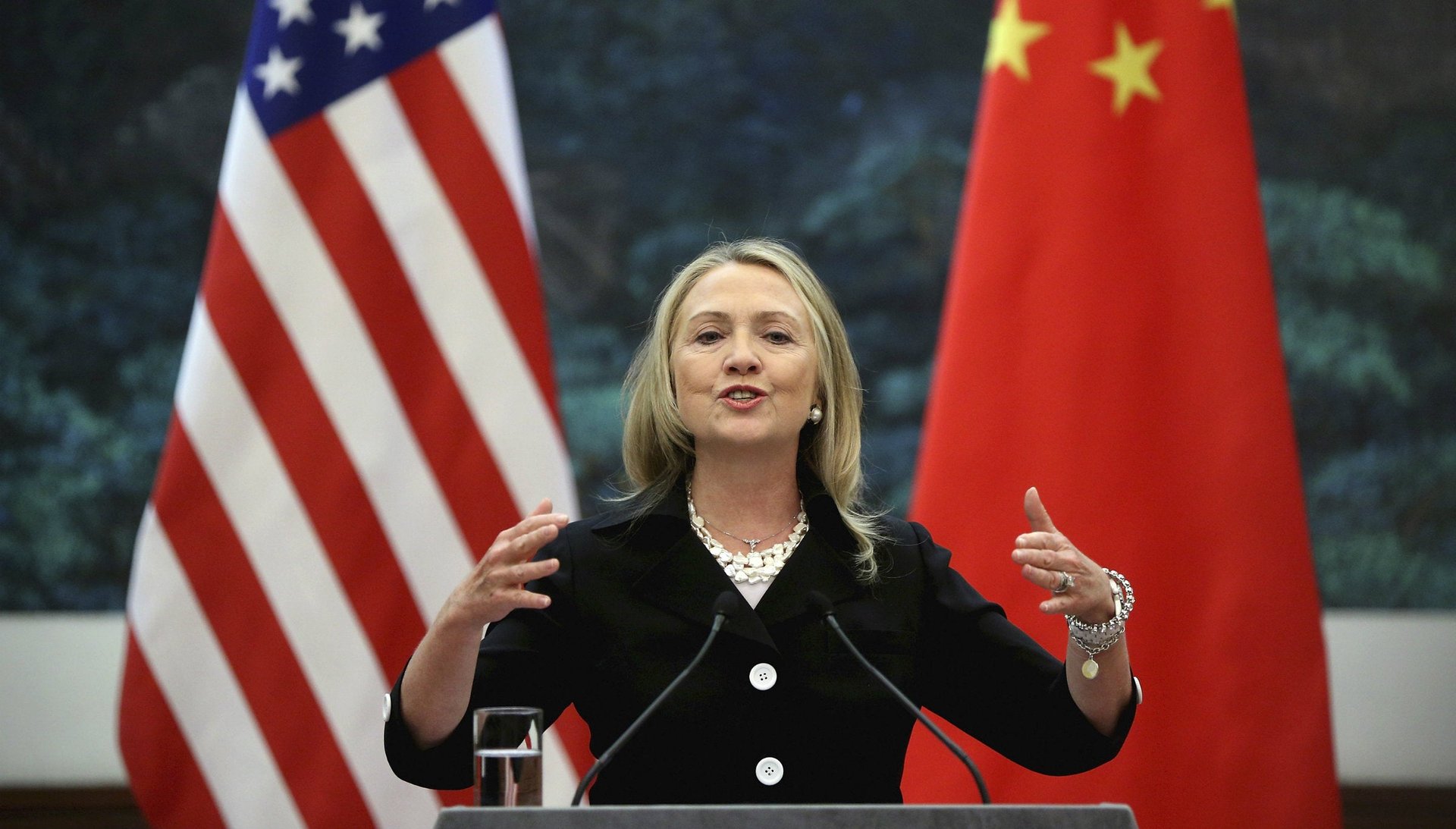What president Hillary Clinton could mean for China
As US secretary of state, Hillary Clinton made history when she introduced the US “pivot to Asia” during a 2010 trip to Vietnam, by declaring what happens in the South China Sea one of the US’s national interests. Designed to counter China’s growing influence in the region, the policy signaled a huge shift in America’s geopolitical priorities—including Clinton’s vision of ”America’s Pacific Century,” in which the United States would deepen regional economy ties and keep a close watch on China’s military plans.


As US secretary of state, Hillary Clinton made history when she introduced the US “pivot to Asia” during a 2010 trip to Vietnam, by declaring what happens in the South China Sea one of the US’s national interests. Designed to counter China’s growing influence in the region, the policy signaled a huge shift in America’s geopolitical priorities—including Clinton’s vision of ”America’s Pacific Century,” in which the United States would deepen regional economy ties and keep a close watch on China’s military plans.
Since leaving the Obama administration, Clinton seems to have sharpened her criticism of China. In Hard Choices, her 2014 political memoir, Clinton writes about China’s censorship, her disagreements with Beijing over the treatment of Tibetans, and dissident lawyer Chen Guangcheng’s escape to the US embassy. The book is banned in China.
On Twitter, Clinton recently called for the release of five female activists behind held in China, a declaration sure to irritate Chinese officials, who consider such criticism meddling in China’s internal affairs:
So when Clinton officially declared her presidential candidacy this past weekend, the reaction in China was swift, and often critical.
Clinton’s presidential run means that “China gets shot even when lying down,” much like an innocent bystander, proclaimed an editorial in the state-run Huanqiu newspaper (link in Chinese). The Chinese public doesn’t like the former First Lady, the editorial proclaims, and there is a possibility that Sino-American frictions will go up if she is elected president.
The most popular comment on a state-run news site called her an “old witch,” another suggested she would start World War Three, Tea Leaf Nation reports (registration required). The Chinese internet hates her “more than the Republicans do,” Tea Leaf authors said.
Chinese netizens also seized on the occasion to criticize US democracy. One popular blogger wrote on Sina Weibo:
I heard little sister Hillary announces running for the US president in 2016 and his opponent is little brother [Jeb] Bush. I want to know why a democratic election always selects from two families. Are all the other Americans idiots?
The US’s pivot to Asia is lately seen by political analysts as something of a failure, partially because the US’s foreign policy attention has been pulled elsewhere. But a Hillary Clinton presidency could revive that focus, and perhaps usher in a previously untested era of US-China cooperation.
Clues to Clinton’s future presidential plans can be found in a 2014 policy paper about the “new model” of a “major power relationship” between China and the US. As The Diplomat pointed out when the paper was released, its US authors and signers include several former advisers to both Bill and Hillary Clinton, including former national security adviser Sandy Berger and Neera Tanden, who worked on Hillary’s 2008 presidential campaign.
The paper promotes international bodies and agencies as a way to contain the power of both countries, but is frank about potential resistance to that approach:
Some of the most worrisome issues in the current U.S.-China relationship are in areas that lack common rules and institutions, such as cyber espionage and outer space, where there are no established procedures or independent bodies to manage such disputes.Chinese leaders should welcome a future where the United States is further bound by rules and the international community has a role in keeping both big powers honest…The challenge in implementing this future, of course, is that nationalists in every country resist being bound by any international rules or standards.
Nationalists in both countries don’t need to start worrying yet. With the US election more than a year away, for now any theories about how Clinton may deal with China remain speculative. And, of course, she would need to win that election first.